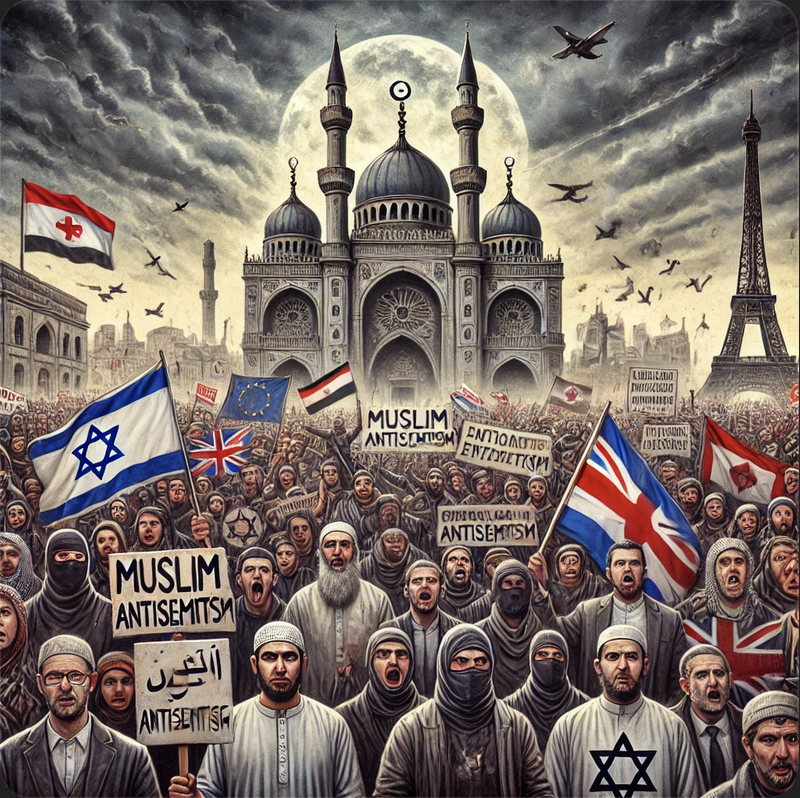

By Tim Orr
In recent years, Europe has experienced a troubling resurgence of antisemitism, with incidents reaching levels unseen since the mid-20th century. On October 7, 2023, I had a life-changing encounter with this hatred, witnessing firsthand the genocidal rhetoric from both progressive and Muslim sources. Rarely have moments in my life shifted my perspective as profoundly as this one, reshaping how I would live moving forward. The paradigm shift deepened the following day when protests erupted, with Muslims and secular progressives accusing Jews of apartheid even before Israel had responded to the attacks. The extent of European Jew-hatred was on full display. My understanding grew further during a series of unsettling Uber rides, where nearly half felt dangerous. Three times, I came close to getting out of the car. It was in those moments that I began to fully grasp the realities of Islam outside the Western context, recognizing that these forces were now firmly embedded within the West.
The atrocities committed by Hamas on October 7th were beyond comprehension—acts of brutal violence, including rapes, murders, and the public display of bodies paraded on top of cars as if celebrating the horror. The sheer savagery of these actions shocked the world, revealing the depths of human cruelty when hatred is left unchecked. As Bari Weiss described it, "Entire families were murdered in their homes. Women were raped. Grandmothers were executed. Bodies were paraded around." In one horrifying instance, a man called his family to celebrate that he had killed ten Jews, and his family joined in the celebration with no empathy—only hatred. These actions reflect a deep-rooted hatred that is difficult to grasp.
Before, my sole purpose was loving Muslims, building relationships, and sharing the gospel. That part has not changed. What has been added is a focus on Christian polemics—exposing what I believe to be Islam’s lies, particularly concerning Islamic antisemitism. This shift has also become a source of academic research for me. What follows is my study on Muslim antisemitism in Europe, aimed at making sense of the UK’s reaction to the October 7th massacre.
As tensions flare between religious, political, and social groups, one alarming trend stands out: the growing involvement of Europe’s Muslim population in antisemitic acts. Fueled by a complex mix of cultural narratives, geopolitical conflicts, and radical ideologies, this phenomenon has left many questioning how these hostile attitudes have taken root in communities that now form a significant part of Europe's demographic fabric. Understanding the underlying forces behind this rise is not just an academic exercise—it’s a critical step toward reversing a dangerous tide of intolerance and violence. What follows is my study on Muslim antisemitism in Europe, aimed at making sense of the UK’s reaction to the October 7th massacre.
France, which hosts one of Europe’s largest Jewish populations, has witnessed a significant increase in antisemitic incidents over the past two decades. According to recent estimates, the Muslim population in Europe is around 25 to 30 million. This represents about 5-6% of Europe's total population. Most Muslims in Europe are concentrated in countries such as France, Germany, and the United Kingdom, with significant populations in Italy and the Balkans, particularly in countries like Albania, Bosnia and Herzegovina, and Kosovo.
The examination of antisemitism in Europe has often revealed complex intersections between religious, political, and social dynamics. Islamic antisemitism, in particular, has emerged as a significant topic of research, especially in the context of growing migration from Muslim-majority countries to Europe and the tensions surrounding the Israeli-Palestinian conflict. Understanding the roots and manifestations of this phenomenon is crucial to addressing its historical antecedents and contemporary developments.
Exploring Islamic Antisemitism
Günther Jikeli is a German historian and scholar specializing in contemporary antisemitism, focusing on Muslim and Islamist antisemitism in Europe. He holds the Erna B. Rosenfeld Professorship in Jewish Studies at Indiana University Bloomington. He has conducted groundbreaking research on how antisemitic attitudes manifest across different social groups, including European Muslims. Drawing on large-scale surveys, Jikeli quantifies the prevalence of antisemitism within Muslim populations compared to the general European population. The European Union conducted one significant study he points to in his research involving interviews with 5,600 Jews across eight European countries, asking about their experiences with antisemitic harassment and violence. The majority of those who had encountered antisemitism attributed these incidents to Muslim perpetrators. In the UK, for instance, 44% of Muslims expressed negative views toward Jews, compared to just 7% of the general population. In Germany, 44% of Muslims held such views versus 22% of the broader population, while in France, the numbers were 28% among Muslims and 13% in the general population. These statistics highlight the prominence of antisemitism within Muslim communities in contrast to the general European populace.
Support Tim on Patreon!
Rising Trends of Antisemitism and Islamist Influence
According to Jikeli, antisemitic incidents, which are directly related to high Muslim populations, have steadily risen, with a marked spike in violent acts occurring in 2014. During that year, the number of violent antisemitic attacks doubled compared to previous years, illustrating that this is not a passing trend but an escalating crisis. This surge in violence reflects an underlying process of radicalization and growing antisemitism among segments of the Muslim population, driven by a combination of political, cultural, and religious narratives internalized within these communities.
One of Jikeli’s most alarming findings is that nearly 50% of all antisemitic acts in France are perpetrated by Muslims, despite Muslims being a minority of the French population. This disproportionate representation of Muslims among antisemitic perpetrators points to unique factors influencing this group, further compounded by the fact that Muslim extremists have carried out all major terrorist attacks against Jews in France. Similar trends of Muslim-perpetrated antisemitism have been observed in other European countries, indicating that this is not an isolated issue but part of a broader transnational problem. While other forms of antisemitism, such as far-right extremism, continue to exist, Muslim antisemitism is becoming the primary source of violent attacks, particularly connected to extremist ideologies.
Jikeli identifies several key categories of antisemitic justifications prevalent among European Muslims. The first category involves classic antisemitic stereotypes, including conspiracy theories that claim Jews control global finance or politics. The second category centers on the Israeli-Palestinian conflict, where many European Muslims conflate Israeli state actions with Jewish identity, leading to broad generalizations like “Jews kill children.” The third category is rooted in ethnic and religious identity, where many young Muslims view Jews as historical enemies of Islam, reinforced by cultural and religious teachings that portray Jews and Muslims in perpetual conflict.
Islamist organizations also play a significant role in shaping antisemitic attitudes among European Muslims. Groups like the Muslim Brotherhood and Milli Görüş in Germany often promote antisemitic views as part of their broader political agenda. These organizations significantly influence Muslim communities, particularly through educational and social networks. For instance, biased portrayals of Israel in school textbooks further entrench negative stereotypes about Jews. In the UK, some Muslim organizations have even boycotted Holocaust Memorial Day, undermining efforts to educate the public about Jewish suffering and further isolating Muslim communities from broader European efforts to promote tolerance.
Patterns and Categories of Antisemitic Attitudes Among Muslims
In European Muslim Antisemitism: Why Young Urban Males Say They Don't Like Jews, Jikeli identifies four patterns of antisemitic attitudes among European Muslims, which he found to be consistent across three different countries in Europe. These patterns provide a framework for understanding how antisemitism manifests in this demographic:
- "Classic" Antisemitic Attitudes: These are based on traditional stereotypes, such as Jews controlling media or governments and conspiracy theories about Jewish power. Jikeli found these deeply ingrained and perpetuated by misinformation.
- Anti-Jewish Attitudes Concerning Israel: Hostility towards Jews due to the Israeli-Palestinian conflict is common, where actions of the Israeli state are often conflated with Jewish people as a whole. Jikeli highlights how media portrayals and political rhetoric exacerbate these sentiments.
- Anti-Jewish Attitudes Concerning Islam or Ethnic Identity: Here, antisemitism is framed through a religious lens, viewing Jews as enemies of Islam or historical antagonists. This is often influenced by interpretations of Islamic texts and reinforced by political conflicts between Muslim-majority and Jewish-majority regions.
- Anti-Jewish Attitudes Without Rationalization: These prejudices exist without explicit reasoning, often passed down through cultural or societal biases. Jikeli points out that many young men he interviewed couldn’t explain why they held such views, showing how deeply ingrained and normalized these attitudes are in certain communities.
Jikeli’s work uncovers the troubling reality that many young Muslims feel no need to justify their antisemitic views, seeing them as a cultural norm. The normalization of antisemitism as an accepted part of daily language and behavior poses significant challenges for counteracting these attitudes, as it requires both cultural and educational shifts.
Addressing the Problem: Education, Dialogue, and Research
Jikeli suggests that combating Muslim antisemitism requires a multi-pronged approach, beginning with education. Governments must ensure school curricula provide balanced and nuanced portrayals of Jewish history and the Israeli-Palestinian conflict. Critical thinking skills should also be emphasized to help young people question the stereotypes and misinformation in media and social networks. He also advocates for cutting government subsidies to Islamist organizations that perpetuate antisemitism and redirecting resources to initiatives that promote tolerance and intercultural understanding.
In addition to educational reforms, interfaith dialogue is essential. Engaging moderate Muslim voices that openly stand against antisemitism can help bridge divides between Jewish and Muslim communities. By fostering conversations that break down long-standing prejudices, it may be possible to shift the cultural norms sustaining antisemitic attitudes.
Empirical research plays a key role in addressing this problem. Often, when Islamic antisemitism is pointed out, some Muslims respond by accusing critics of Islamophobia, a tactic used to silence opposing views. This response conflates criticism of antisemitism with hostility toward Islam. Empirical research provides objective data that can cut through such defenses, separating politically driven hate from genuine religious belief. It offers a strong foundation for creating educational initiatives and interfaith dialogues that directly address antisemitism in Muslim communities.
By tracking the impact of these programs, researchers can monitor changes in attitudes and refine strategies for maximum effectiveness. Historical data on Jewish-Muslim cooperation during medieval Islamic empires can also provide a counter-narrative to modern divisive rhetoric, helping to dismantle stereotypes and promote understanding.
Conclusion
Günther Jikeli’s research provides a comprehensive analysis of the rise of Muslim antisemitism in Europe, uncovering the social, cultural, and political factors that drive these attitudes. His work emphasizes the importance of targeted interventions in education and policy to combat this growing threat. As antisemitism continues to rise, addressing its roots and manifestations is crucial for developing effective strategies to counter it. Education, political reform, and interfaith dialogue remain vital in this fight, offering a path toward greater understanding and peace.
This approach not only exposes the problem but actively contributes to creating solutions. Through empirical research, educational programs can be designed to confront antisemitism in a way that avoids broad generalizations and fosters mutual respect. Focusing on facts and evidence can build bridges between communities, fostering a dialogue that moves beyond defensive accusations and toward productive, informed conversations.
Citation:
Dr. Günther Jikeli - "European Muslim Antisemitism." ISGAP International. YouTube, 14 Dec. 2016. https://www.youtube.com/watch?v=kg-rxCT9sN8.
Tim Orr is a scholar, Evangelical minister, conference speaker, and interfaith consultant with over 30 years of experience in cross-cultural ministry. He holds six degrees, including a master’s in Islamic studies from the Islamic College in London. Tim taught Religious Studies for 15 years at Indiana University Columbus and is now a Congregations and Polarization Project research associate at the Center for the Study of Religion and American Culture at Indiana University Indianapolis. He has spoken at universities, including Oxford University, the University of Tehran, and mosques throughout the U.K. His research focuses on American Evangelicalism, Islamic antisemitism, and Islamic feminism, and he has published widely, including articles in Islamic peer-reviewed journals and three books.
Explore More: Dive into Tim's Articles on Islamic Antisemitism
 Dr. Tim Orr's BlogDr. Tim Orr
Dr. Tim Orr's BlogDr. Tim Orr
Don't Miss Out on His YouTube Channel!
 YouTube
YouTube
Sign up for Dr. Tim Orr's Blog
Dr. Tim Orr isn't just your average academic—he's a passionate advocate for interreligious dialogue, a seasoned academic, and an ordained Evangelical minister with a unique vision.
No spam. Unsubscribe anytime.
